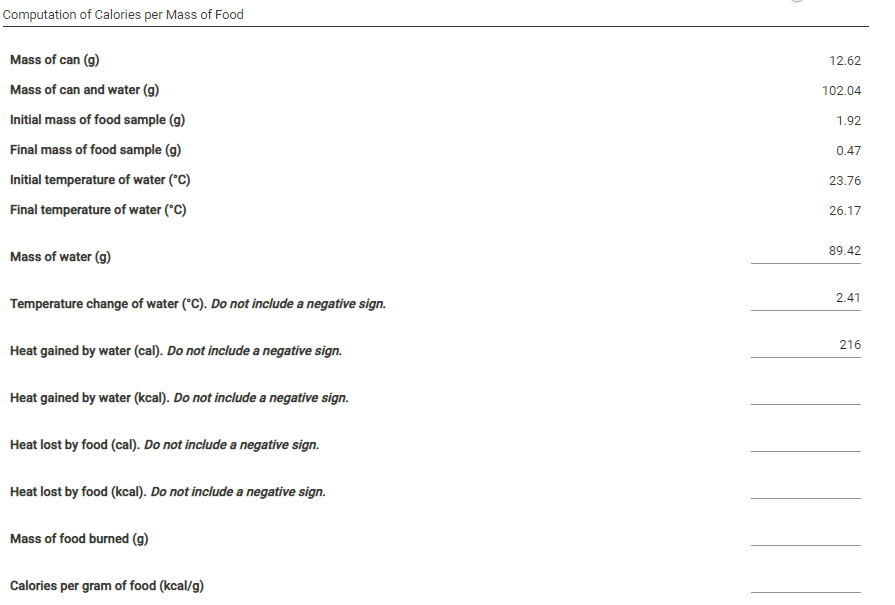Computation of Calories per Mass of Food Mass of can (g) 12.62 Mass of can and water (g) 102.04 Initial mass of food sample (g) 1.92 Final mass of food sample (g) 0.47 Initial temperature of water ("C) 23.76 Final temperature of water ("C) 26.17 89.42 Mass of water (g) 2.41 Temperature change of water (*C). Do not include a negative sign. 216 Heat gained by water (cal). Do not include a negative sign. Heat gained by water (kcal). Do not include a negative sign. Heat lost by food (cal). Do not include a negative sign. Heat lost by food (kcal). Do not include a negative sign. Mass of food burned (g) Calories per gram of food (kcal/g)
Computation of Calories per Mass of Food Mass of can (g) 12.62 Mass of can and water (g) 102.04 Initial mass of food sample (g) 1.92 Final mass of food sample (g) 0.47 Initial temperature of water ("C) 23.76 Final temperature of water ("C) 26.17 89.42 Mass of water (g) 2.41 Temperature change of water (*C). Do not include a negative sign. 216 Heat gained by water (cal). Do not include a negative sign. Heat gained by water (kcal). Do not include a negative sign. Heat lost by food (cal). Do not include a negative sign. Heat lost by food (kcal). Do not include a negative sign. Mass of food burned (g) Calories per gram of food (kcal/g)
Chemistry for Engineering Students
4th Edition
ISBN:9781337398909
Author:Lawrence S. Brown, Tom Holme
Publisher:Lawrence S. Brown, Tom Holme
Chapter9: Energy And Chemistry
Section: Chapter Questions
Problem 9.50PAE: 9.50 When a 13.0-g sample of NaOH(s) dissolves in 400.0 mL of water in a coffee cup calorimeter, the...
Related questions
Question
Need help with these calculations

Transcribed Image Text:Computation of Calories per Mass of Food
Mass of can (g)
12.62
Mass of can and water (g)
102.04
Initial mass of food sample (g)
1.92
Final mass of food sample (g)
0.47
Initial temperature of water ("C)
23.76
Final temperature of water (°C)
26.17
89.42
Mass of water (g)
2.41
Temperature change of water (*C). Do not include a negative sign.
216
Heat gained by water (cal). Do not include a negative sign.
Heat gained by water (kcal). Do not include a negative sign.
Heat lost by food (cal). Do not include a negative sign.
Heat lost by food (kcal). Do not include a negative sign.
Mass of food burned (g)
Calories per gram of food (kcal/g)
Expert Solution
This question has been solved!
Explore an expertly crafted, step-by-step solution for a thorough understanding of key concepts.
This is a popular solution!
Trending now
This is a popular solution!
Step by step
Solved in 2 steps

Knowledge Booster
Learn more about
Need a deep-dive on the concept behind this application? Look no further. Learn more about this topic, chemistry and related others by exploring similar questions and additional content below.Recommended textbooks for you

Chemistry for Engineering Students
Chemistry
ISBN:
9781337398909
Author:
Lawrence S. Brown, Tom Holme
Publisher:
Cengage Learning

General Chemistry - Standalone book (MindTap Cour…
Chemistry
ISBN:
9781305580343
Author:
Steven D. Gammon, Ebbing, Darrell Ebbing, Steven D., Darrell; Gammon, Darrell Ebbing; Steven D. Gammon, Darrell D.; Gammon, Ebbing; Steven D. Gammon; Darrell
Publisher:
Cengage Learning

Chemistry: An Atoms First Approach
Chemistry
ISBN:
9781305079243
Author:
Steven S. Zumdahl, Susan A. Zumdahl
Publisher:
Cengage Learning

Chemistry for Engineering Students
Chemistry
ISBN:
9781337398909
Author:
Lawrence S. Brown, Tom Holme
Publisher:
Cengage Learning

General Chemistry - Standalone book (MindTap Cour…
Chemistry
ISBN:
9781305580343
Author:
Steven D. Gammon, Ebbing, Darrell Ebbing, Steven D., Darrell; Gammon, Darrell Ebbing; Steven D. Gammon, Darrell D.; Gammon, Ebbing; Steven D. Gammon; Darrell
Publisher:
Cengage Learning

Chemistry: An Atoms First Approach
Chemistry
ISBN:
9781305079243
Author:
Steven S. Zumdahl, Susan A. Zumdahl
Publisher:
Cengage Learning

Chemistry & Chemical Reactivity
Chemistry
ISBN:
9781133949640
Author:
John C. Kotz, Paul M. Treichel, John Townsend, David Treichel
Publisher:
Cengage Learning

Chemistry & Chemical Reactivity
Chemistry
ISBN:
9781337399074
Author:
John C. Kotz, Paul M. Treichel, John Townsend, David Treichel
Publisher:
Cengage Learning

Chemistry: Principles and Reactions
Chemistry
ISBN:
9781305079373
Author:
William L. Masterton, Cecile N. Hurley
Publisher:
Cengage Learning